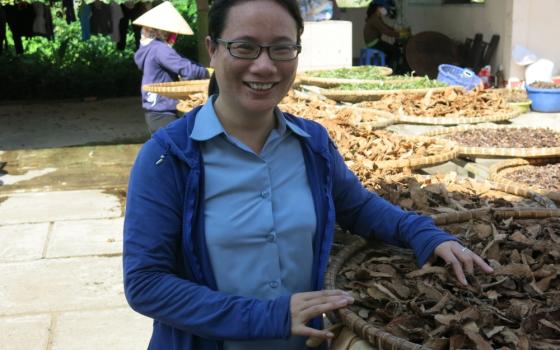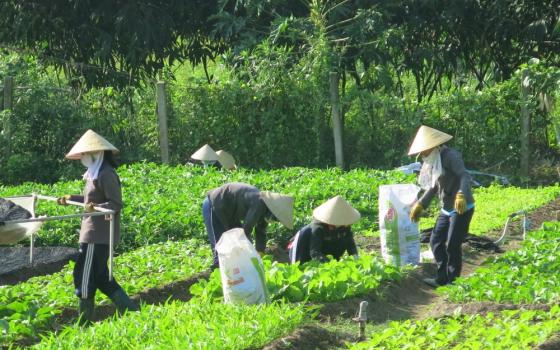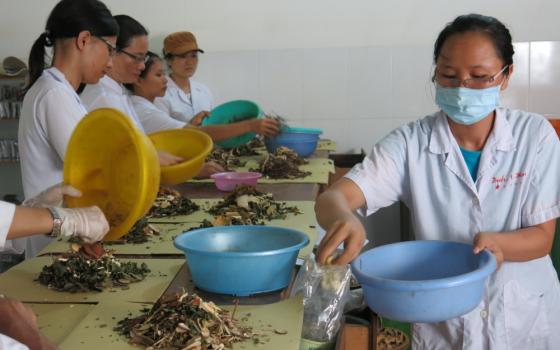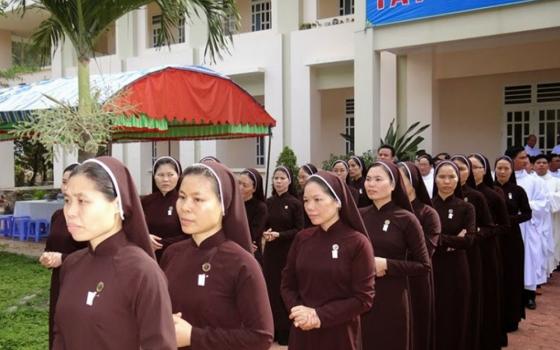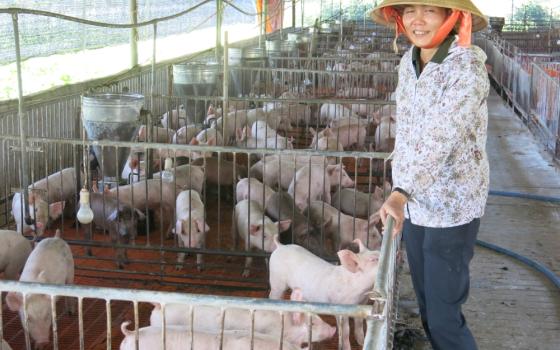The Social and Charitable Services Society, one of Vietnam’s youngest institutes and societies for women who are not professed religious, was founded by the late Bishop Paul Nguyen Thanh Hoan of Phan Thiet diocese in southern Vietnam in 1995.
The society, based in southern Binh Thuan province, draws 170 members who raise pigs for their own living and treat patients with herbal remedies without charge. They also provide piglets for poor women to raise as a way to improve their circumstances.
Sr. Mary Nguyen Thi Quynh Nga, 33, is an herbalist who entered the society in 2002. She currently serves as its superior.
Canon 731 stipulates that “Societies of apostolic life resemble institutes of consecrated life; their members, without [taking] religious vows, pursue the apostolic purpose proper to the society and leading a life in common as brothers or sisters according to their proper manner of life, strive for the perfection of charity through the observance of the constitutions.”
The women in the society live much as do women religious. They devote themselves to God and God’s work. They undergo a similarly strict process to qualify for membership. They commit themselves to chastity, obedience and poverty in a ceremony before the bishop and the diocese. And, when formal, they dress in habits. There are five such societies operating in Vietnam.
GSR recently interviewed Nga about her society.
Please tell me how your society started.
In 1995, then Fr. Paul Nguyen Thanh Hoan gathered eight female students from poor families from his native Nghe An province at his Thanh Linh parish in Binh Thuan province. The students were given opportunities to complete high school and further their studies. They also studied church subjects and experienced communal living.
More and more young women, regardless of their education and physical challenges, have joined the group; and the society with its motto “Good News to the Poor” (Lk 4:18) was born.
At first, we cultivated and produced cane sugar and raised cows for a living. Some shared a bed or slept on the floors of catechism classrooms. We suffered a lack of food and water, learned lessons under candlelight, and walked to the farms. Our founder, Fr. Hoan, had to trap wild birds for food.
The society was not officially approved until 2004 by Bishop Nicolas Huynh Van Nghi of Phan Thiet diocese and was recognized by the Vietnamese government two years later. [All official religious organizations must be approved by the government, as required by law.]
Why do young women enter the society?
Currently the society has 170 members, most in their 20s and 30s. They are inspired by its ideal of loving and serving the poor, which is suitable for the spirit of Vatican Council II and Pope Francis: The church is of the poor and for the poor; the church proclaims the Good News.
We live with the spirit of poverty, support one another in studying and working, and share a communal life.
We base ourselves at an 8-hectare [20-acre] farm where we raise pigs to support ourselves. We are happy with our vocations and conditions.
What about the formation?
Candidates spend 18 months learning about the society’s charism, activities and communal life, and they study human values and basic catechism before deciding to enter the novitiate for one year.
They make a preliminary commitment after finishing the novitiate and courses of the Scriptures, church history, evangelical counsels and other subjects. Then they expand their studies at church study houses in Nha Trang and Ho Chi Minh City for three to five years before demonstrating a final commitment to the society. On average, 12 people obligate themselves every year.
What challenges do you face being such a young society?
We face financial difficulties and lack facilities. We mainly live on our income from raising pigs. No money is reserved for difficult times. We still lack medical staff and cannot afford to set up more communities in other places.
The women have to share small and inconvenient houses. The society cannot afford to buy health insurance for members and cover their travel fees to visit families on the Lunar New Year.
How does your society work with the poor?
We also grow herbs and produce herbal medicines. Patients come to get free diagnoses, medicines, physiotherapy and acupuncture from us.
Some 50 women train as physicians and herbalists, and others are veterinarians. We also have some communities based in other remote places to serve poor people.
We offer poor women six to 10 piglets each, food, medicines and livestock techniques. After three months, they sell the pigs and return the capital investment to us. While they raise the pigs, they also grow crops. The project aims to improve their incomes and human dignity.
[Joachim Pham is a correspondent for Global Sisters Report, based in Vietnam.]
